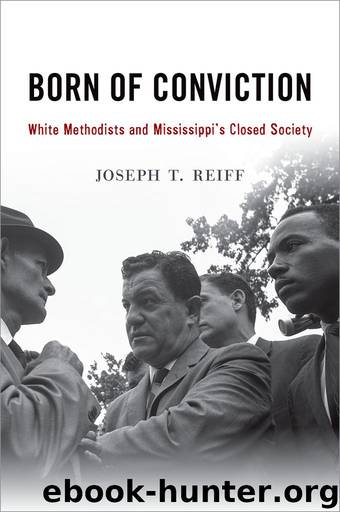Born of Conviction by Reiff Joseph T.;

Author:Reiff, Joseph T.;
Language: eng
Format: epub
Publisher: Oxford University Press
Published: 2015-03-01T16:00:00+00:00
FIGURE 8.5Wallace Roberts, 1986. Courtesy of Mark Roberts.
When Joe Way left the state in 1964 for the air force chaplaincy, he kept his membership in the Mississippi Conference and returned each year for the annual conference session as a continuing “means of witnessing.” During his first few years away, he felt unwelcome at annual conference; some ministers asked what he was doing there and expressed displeasure upon learning he was still a conference member. In 1987, Way retired from the air force and returned to Mississippi, requesting a local church appointment. In his view, the appointment offered did not give him credit for his lengthy ministerial experience, so he served as a chaplain at the VA Hospital in Gulfport for the next five years. In 1992, he became the fourth member of the Twenty-Eight to serve Leggett Memorial Church in Biloxi, where he stayed a year. He served a year at Lumberton and then two years at Caswell Springs, where Jerry Trigg was pastor in 1962–3. While there, Way did not tell church members that he had also signed Born of Conviction. In 1996, he retired from the conference and eventually moved to Texas. He also never regretted his participation in the Twenty-Eight and believed he could not have lived with himself if he had not signed the statement. Though he felt forced to leave Mississippi in 1964, he came to see it as a good thing: “It set me and my family free. I, my wife and children had much greater opportunities and experiences than we could ever have had in Mississippi.”64
The twenty members of the Twenty-Eight who left Mississippi did so for many reasons, ranging along a spectrum from true “force” and virtually no choice to relatively free choice. Their exodus cannot be explained as simply a case of “the closed society [battering] the outspoken young preachers upon the anvil of public opinion,” though most experienced some battering. To varying degrees, roughly a dozen of the twenty who left Mississippi could have stayed, and if they all had, Born of Conviction would not be so commonly cited as an illustration of the “spoke out, forced out” narrative.65
The early 1963 declaration closed with a commitment to “STAND TOGETHER IN SUPPORT OF THESE PRINCIPLES.” Sociologist Jeffrey Hadden’s study of the church’s struggle to respond to the racial crisis in the 1950s and 1960s offers insight into the process of clergy involvement in conflict situations. A group of clergy defines and gathers to discuss a serious social problem, and their interaction results in a shared sense of commitment to a cause. They see an opportunity to act as a group on their convictions, but once they take controversial action, they need positive reinforcement in order to maintain their commitment. Hadden surveyed many of the Twenty-Eight after the Born of Conviction controversy and interviewed a few of them, and he decided their main problem was not enough positive reinforcement. They were physically separated from each other, and the storm created by their statement proved greater than they expected.
Download
This site does not store any files on its server. We only index and link to content provided by other sites. Please contact the content providers to delete copyright contents if any and email us, we'll remove relevant links or contents immediately.
| Anglican | Baptist |
| Book of Common Prayer | Calvinist |
| Episcopalian | Inspirational |
| Lutheran | Methodist |
| Pentecostal & Charismatic | Presbyterian |
| Quaker | Seventh-Day Adventist |
| Shaker | Theology |
Angels by Billy Graham(1852)
How To Be Born Again by Billy Graham(1683)
Peace with God by Billy Graham(1584)
Unbroken Curses by Rebecca Brown & Daniel Yoder(1472)
God's Prophetic Symbolism in Everyday Life by Adam Thompson & Adrian Beale(1394)
The School of Biblical Evangelism by Ray Comfort(1338)
Martin Luther: The Man Who Rediscovered God and Changed the World by Eric Metaxas(1321)
Call by Rick Joyner(1314)
Power over the Enemy by John Osteen & Joel Osteen(1281)
Jonathan Edwards: A Life by Marsden George M(1156)
The Supernatural Power of a Transformed Mind Expanded Edition: Access to a Life of Miracles by Bill Johnson(1142)
Prayers That Bring Healing and Activate Blessings: Experience the Protection, Power, and Favor of God by John Eckhardt(1141)
Fresh Wind, Fresh Fire by Jim Cymbala(1134)
Unmasking the Devil: Strategies to Defeat Eternity's Greatest Enemy by John Ramirez(1128)
An Altar in the World by Barbara Brown Taylor(1117)
Reformation Theology by Littlejohn Bradford(1094)
Liturgy of the Ordinary by Tish Harrison Warren(1089)
Seeing the Voice of God: What God Is Telling You through Dreams and Visions by Smith Laura Harris(1071)
Martin Luther by Mansch Larry D.; Peters Curtis H.;(1070)
